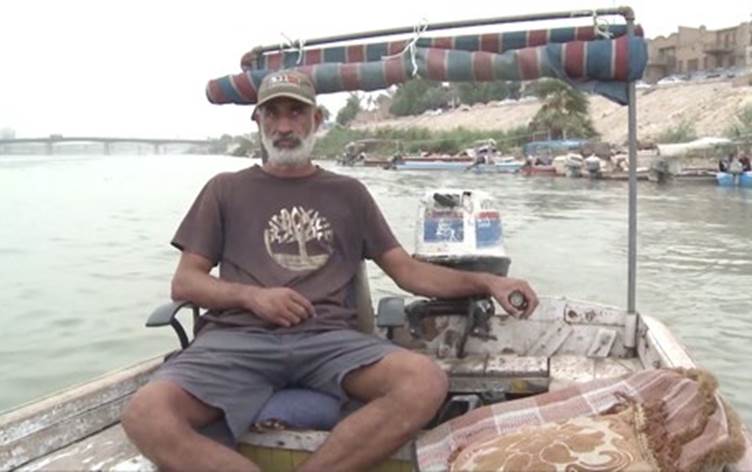The old profession of fishing is disappearing from the Tigris River in Iraq as low water levels and pollution have led to the decrease in populations of wild fish.
As the most important river in Iraq, the Tigris connects several major cities of the country. Many fishermen used to go fishing here, making a distinctive scene on the river.
"I started to learn fishing at the age of 12. I stopped for a while and then have been doing it for a living ever since. I'm totally used to the job now," said Ahmed Hassan Lilo, a fisherman on Tigris.
The wild fish in the Tigris river is a delicacy favored by the Iraqis. For decades, although all kinds of imported fish are available on the market, Lilo has managed to make a living by fishing.
However, Lilo can barely catch any fish nowadays as the water level of the river dropped significantly.
"The water level is so low these days. Wild fish like carp usually swim upstream by nature, but now they wouldn't come when there's not much water at all," he said.
The water level of the Tigris has been falling as a result of the destruction of water facilities by war in recent years.
Apart from that, the discharge of household and industrial sewage into the river has severely polluted the water as well, killing most of the fish.
According to Lilo, it was the poor infrastructure and management that made many of the fishermen on the Tigris river leave.
"There used to be 17 fishermen in this area. Now there are only five of us," said Lilo.
For Lilo, fishing is no longer a money-making business. The reason why he continues to do so is that he loves the river deeply.
"The Tigris River is as important to me as life and I gave it all my love. I hope that it would regain its glory of the past," said Lilo.
As the most important river in Iraq, the Tigris connects several major cities of the country. Many fishermen used to go fishing here, making a distinctive scene on the river.
"I started to learn fishing at the age of 12. I stopped for a while and then have been doing it for a living ever since. I'm totally used to the job now," said Ahmed Hassan Lilo, a fisherman on Tigris.
The wild fish in the Tigris river is a delicacy favored by the Iraqis. For decades, although all kinds of imported fish are available on the market, Lilo has managed to make a living by fishing.
However, Lilo can barely catch any fish nowadays as the water level of the river dropped significantly.
"The water level is so low these days. Wild fish like carp usually swim upstream by nature, but now they wouldn't come when there's not much water at all," he said.
The water level of the Tigris has been falling as a result of the destruction of water facilities by war in recent years.
Apart from that, the discharge of household and industrial sewage into the river has severely polluted the water as well, killing most of the fish.
According to Lilo, it was the poor infrastructure and management that made many of the fishermen on the Tigris river leave.
"There used to be 17 fishermen in this area. Now there are only five of us," said Lilo.
For Lilo, fishing is no longer a money-making business. The reason why he continues to do so is that he loves the river deeply.
"The Tigris River is as important to me as life and I gave it all my love. I hope that it would regain its glory of the past," said Lilo.



Comments
Rudaw moderates all comments submitted on our website. We welcome comments which are relevant to the article and encourage further discussion about the issues that matter to you. We also welcome constructive criticism about Rudaw.
To be approved for publication, however, your comments must meet our community guidelines.
We will not tolerate the following: profanity, threats, personal attacks, vulgarity, abuse (such as sexism, racism, homophobia or xenophobia), or commercial or personal promotion.
Comments that do not meet our guidelines will be rejected. Comments are not edited – they are either approved or rejected.
Post a comment